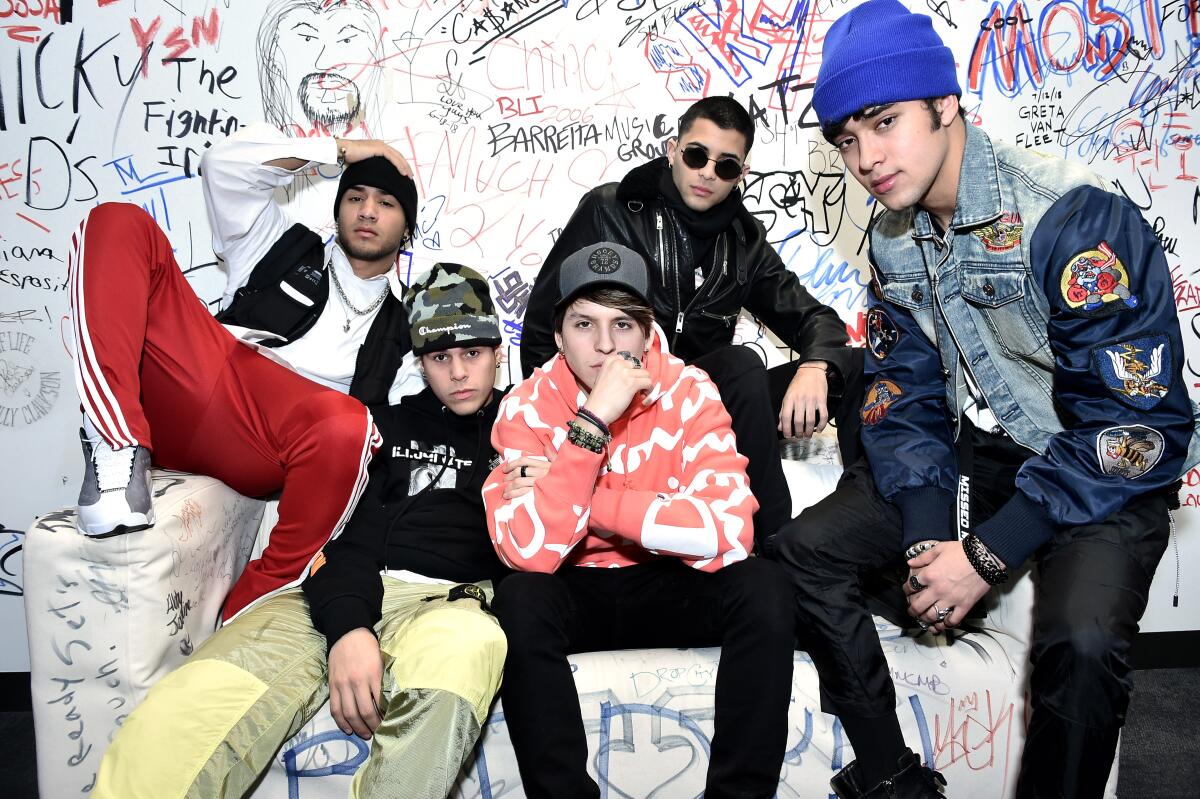Pin-up looks, rabid fans, non-English lyrics: Is CNCO the next world-conquering boy band?
- Share via
In 2015, British record executive and reality TV tycoon Simon Cowell had a novel idea. After assembling the beloved English-Irish boy band, One Direction, for his show “The X Factor,” Cowell would attempt to work the same miracle once more — but this time, in the Latin music space.
And so came to be Univision’s competition singing show, “La Banda,” created by Cowell and produced by Puerto Rican superstar and Menudo boy-band veteran Ricky Martin. “La Banda” viewers voted weekly to advance their favorite singers until a final lineup was cast: Christopher Vélez, 25, Richard Camacho 24, Zabdiel De Jesús, 23, Joel Pimentel, 21 and Erick Brian Colón, 20. Hailing from five different parts of Latin America and dubbed CNCO, the group soared to the top of Billboard’s Top Latin Albums chart, with both its 2016 debut, “Primera Cita” and 2018 album “CNCO.”
In 2020, the band was laying down tracks for its third studio album, prepping its most expansive tour yet and poised to finally break beyond the Latin charts — until COVID-19 planted the band members, and their Air Jordans, firmly on the ground. On March 18, the group announced it would postpone the album indefinitely.
“We had a lot of original songs ready to go,” Pimentel tells The Times. “We just had to adapt to the times.”

CNCO - Tan Enamorados
Over video call, the five band mates call from their shared house in Miami, where they’ve spent most of the pandemic playing video games, working out and preparing their new covers compilation, titled “Déjà Vu,” released on Feb. 5. On it, CNCO presses rewind on its favorite Latin hits of yesteryear, revamping pop classics by artists like Mexican R&B group Sin Bandera, Puerto Rican pop heartthrob Chayanne — and with a nod to its more anglophone-leaning fanbase, Enrique Iglesias’ “Hero.”
Each song is polished anew with the same formula that helped CNCO’s 2016 breakthrough single, “Reggaetón Lento (Bailemos),” go platinum five times: honeyed group harmonies sung in effortless, homegrown Spanglish, guided by a gentle dembow bounce. But in the black-and-white video for their cover of Ricardo Montaner’s 1988 piano ballad, “Tan Enamorados” (“So in Love),” the guys recall an American hit of the same year: New Kids on the Block’s “You Got It (the Right Stuff).” Wrote the New Kids on Twitter: “[CNCO]’s definitely got the right stuff.”
“Even though we couldn’t be on tour, we got to catch up with our families and revisit the music our parents loved,” says De Jesús. “We want to introduce these super iconic songs to our generation and bring people of all ages together through a shared experience of déjà vu.”
It’s not just a cheap nostalgia card the guys are playing: Now in their 20s, the members of CNCO take inspiration from the output of their Latin pop idols as they, too, grew up with their audiences. They’ll be the first to admit that their longevity as a band depends on maturing their sound.
“It is like a marriage, being in a band,” says Camacho, reflecting on CNCO’s fifth anniversary in December. He lets the phrase hang in the air before he adds: “But just the contract!” The guys nod and chuckle. Even if they are bound only by the Sony Music Latin contract they won on “La Banda,”the band mates enjoy ragging on one another much like childhood friends, poking fun at one anothers’ celebrity crushes, which rotate among Selena Gomez, Normani and the Jenner sisters. (No Spanish required.)
“We are five guys from different countries, with very different lifestyles before all this,” says Camacho, who became a father at 20, just as the band was taking off in 2016. His daughter, Aaliyah, makes the occasional cameo on CNCO’s Instagram. “We bring a little bit of everything from Latin America into the mix,” he adds.

The Dominican American Camacho was born in New York City, where he developed a preference for R&B slow jams. De Jesús attended a prestigious ballet academy in Puerto Rico, while the shy Pimentel, a Mexican American from SoCal, was on the musical theater track. Colón, the kid brother of the group, was born in Cuba and lived in the States for only three years before competing on the show; meanwhile the eldest, Vélez, worked several odd jobs in his teens to financially support his family back in Ecuador.
In Latin America, the teen pop wave had come and gone long before CNCO’s members were born. The 1980s produced popular vocal groups like Timbiriche, which counts Mexican divas Thalía and Paulina Rubio as alumni as well as the Puerto Rican outfit Menudo, which famously helped kickstart the career of Ricky Martin. As producer of “La Banda,” Martin eventually took CNCO under his wing, inviting the band to support him on North and South American stops of his One World Tour.
Yet what set the band apart from its mentor was its embrace of an emerging urban-pop fusion sound, which it developed with the help of Wisin, the Puerto Rican rapper and producer who rose to fame as one half of the reggaetón legacy act, Wisin & Yandel. Under the influence of Wisin, CNCO could explore its bad boy side; but much like Martin, CNCO kept it PG-rated enough to mollify the parents of its younger fans.

CNCO happened to emerge just as Latin pop began its renaissance in the U.S. mainstream, hallmarked by the ascent of pop-adjacent MCs like Daddy Yankee, J Balvin and Bad Bunny. This new Latin wave dovetailed with a global pop boom that saw the stratospheric rise of K-pop idol groups like BTS and Blackpink, who rarely, if ever, sing in English. After One Direction’s dissolution left a black hole in the Western pop-music universe, and as millennials and Gen Z clamor for more inclusive, multicultural media, the bilingual CNCO appears primed for mainstream fame.
“This new, contemporary generation of boy band fans tend to be more diverse, politically progressive and curious about the world than those fans that preceded them,” says Maria Sherman, boy-band historian and author of “Larger Than Life: A History of Boy Bands from NKTOB to BTS.”
“’Crossing over’ to appease English-speaking audiences by rerecording in English doesn’t really exist to them the way it did for, say, Latin pop fans in the 1990s,” Sherman adds. “BTS is the shining example. They didn’t release their English-language single ‘Dynamite,’ until seven years into their career. They were already the biggest band on the planet by then.”
Despite making few appearances on non-Latin music charts, CNCO has continued to expand its global fanbase, which has reached well beyond Latin America and the Hispanic community in the U.S. The band has entertained fans as far as Japan and Sweden, where young CNCOwners, as they’ve called themselves, have taken Spanish lessons to communicate with their idols. The vast majority being young girls, CNCOwners conduct themselves like investors or patrons of the band. “Through them we’ve had the power to tour, the power to see different countries, the energy to keep going,” says Vélez. “[The fans] motivate us to be our best.”
Much like K-pop’s fiercest fanbases, says Isabel Feria, senior marketing director at Sony Music Entertainment, CNCOwners act as a virtual street team, flooding social media with praise for the band and leading guerrilla campaigns that result in millions of streams and views. Deep in the comments on YouTube, where CNCO counts nearly 11 million followers, fans urge one another to circulate their videos. “We’ve found it’s very similar to the gaming community,” says Feria. “They use social media and live chat rooms to drive engagement — and now, so do we. So for this cycle, we’re going back to what we did with ‘La Banda’ — the fans get to vote for the next music video they want to see. We have the content ready to go, the fans have their say.”

Despite a pandemic-induced lull, CNCO performed on MTV’s pared-down Video Music Awards in New York, where it out-polled Post Malone and Lady Gaga for “Best Quarantine Performance.” Not long after,CNCO was tapped to appear at the Macy’s Thanksgiving Day Parade. So long as the group retains its distinct international appeal, the band members get to subsist on what really matters to them: showing the world what Latinos in the U.S. have to offer.
“We’re not in competition with any bands,” says Camacho. “Like [BTS] is sharing their culture, we’re sharing our culture. We’ve all got the same dream: to make great music and spread good vibes around the world. That’s how we do our thing.”
More to Read
The biggest entertainment stories
Get our big stories about Hollywood, film, television, music, arts, culture and more right in your inbox as soon as they publish.
You may occasionally receive promotional content from the Los Angeles Times.











